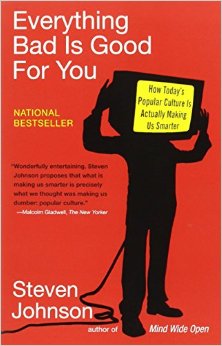 Steven Johnson’s 2005 book Everything Bad is Good for You: How Today’s Popular Culture is Actually Making Us Smarter, offered an enormous boon to everyone who wanted to defend the neurological virtues of our increasingly technologized and media-driven culture. I remember hearing Doug Wilson speak at our former church, where he cited Johnson’s book–which was then required reading at New Saint Andrew’s College–as balancing out the work of Neil Postman.
Steven Johnson’s 2005 book Everything Bad is Good for You: How Today’s Popular Culture is Actually Making Us Smarter, offered an enormous boon to everyone who wanted to defend the neurological virtues of our increasingly technologized and media-driven culture. I remember hearing Doug Wilson speak at our former church, where he cited Johnson’s book–which was then required reading at New Saint Andrew’s College–as balancing out the work of Neil Postman.
In Nicholas Carr’s book The Shallows: What the Internet is Doing to our Brains, Carr responded to Johnson’s claim that book reading under stimulates the senses compared to using a computer. Here is Carr’s rebuttal:
Steven Johnson, in his 2005 book Everything Bad is Good for You, contrasted the widespread, teeming neural activity seen in the brains of computer users with the much more muted activity evident in the brains of book readers. The comparison led him to suggest that computer use provides more intense mental stimulation than does book reading. The neural evidence could even, he wrote, lead a person to conclude that ‘reading books chronically understimulates the senses.’ But while Johnson’s diagnosis is correct, his interpretation of the differing patterns of brain activity is misleading. It is the very fact that book reading ‘understimulates the senses’ that makes the activity so intellectually rewarding. By allowing us to filter out distractions, to quiet the problem-solving functions of the frontal lobes, deep reading becomes a form of deep thinking. The mind of the experienced book reader is a calm mind, not a buzzing one. When it comes to the firing of our neurons, it’s a mistake to assume that more is better.
Further Reading
- Burdening the Short-term Memory with Distractions
- Hollowing out the Habits of Attention (Part 1)
- Hollowing out the Habits of Attention (Part 2)
- Hollowing out the Habits of Attention (Part 3)
- Hollowing out the Habits of Attention (Part 4)
- Everything Bad is NOT Good For You
- Why Email is Addictive
- Our Disembodied Selves
- Sherry Turkle on Being Alone Together


